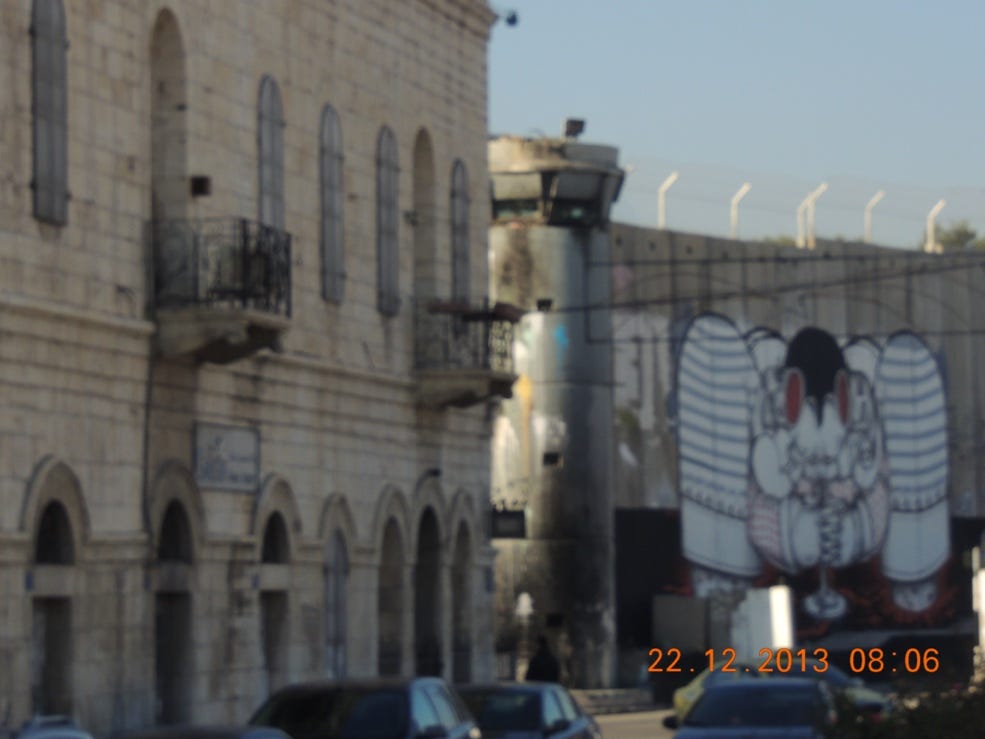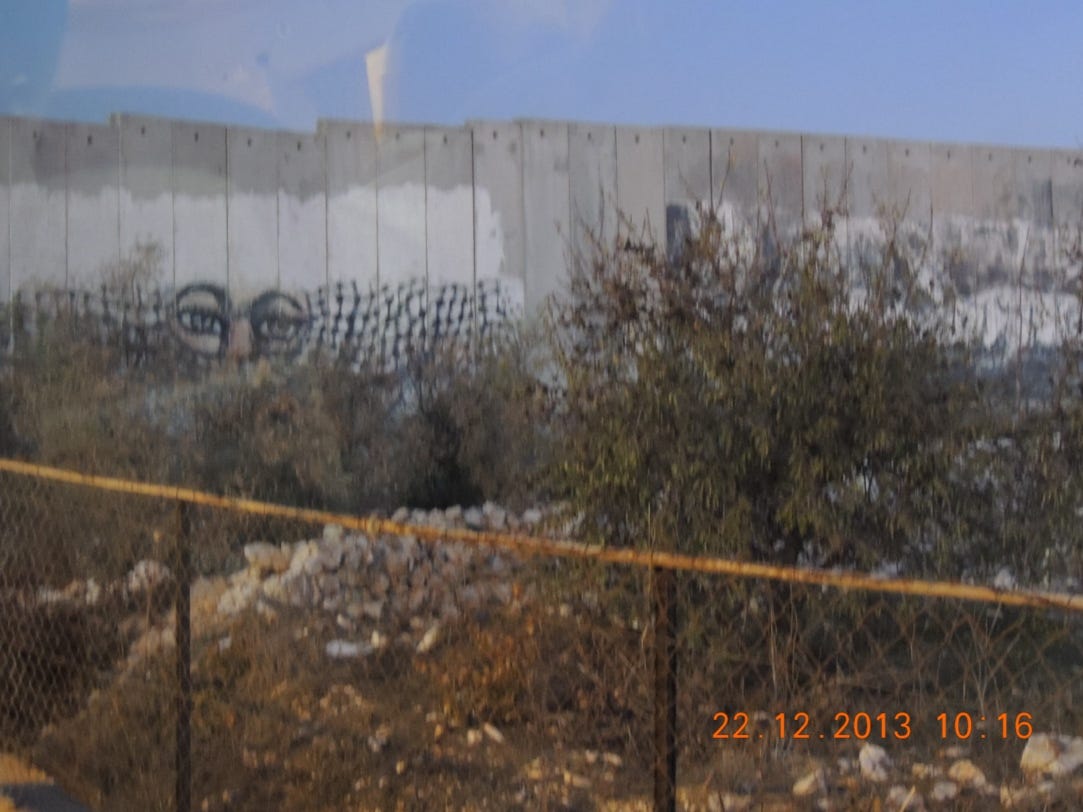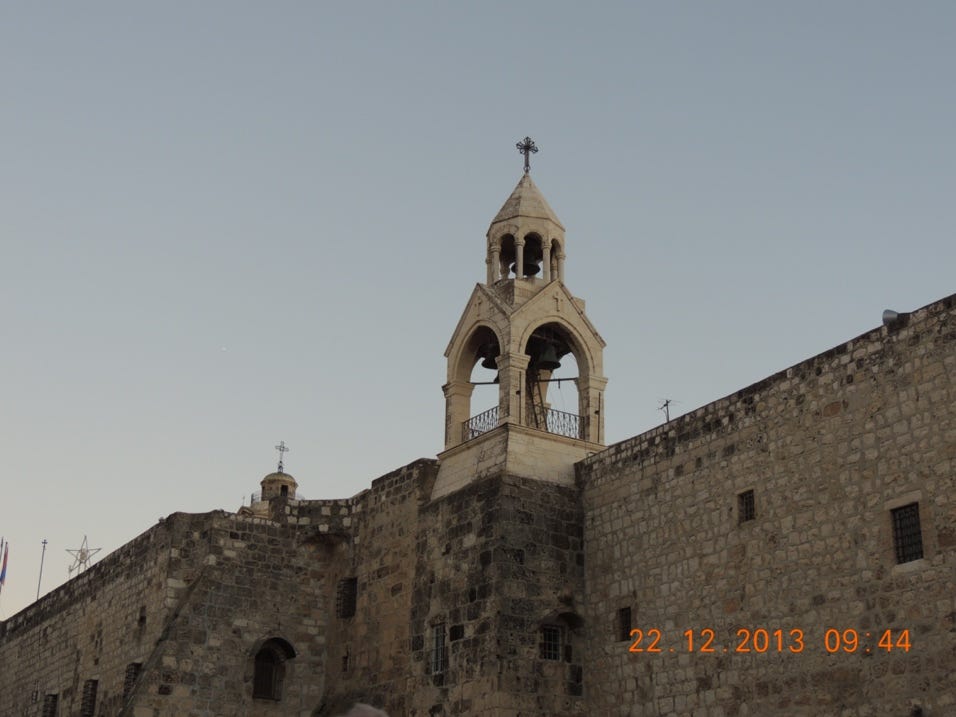Christmas in the West Bank
Writer Nicole Naim Dib speaks of her Christmas memory in the West Bank and about recognising – and speaking up about – apartheid when we see it.
Dear Friends,
We recently received a beautiful piece recounting a Christmas memory in the West Bank from a young writer from Mexico, Nicole Naim Dib. Today, we’d like to share it with you. You can find the shortened version below, and the full version as usual on our website.
To listen to a witness is to become a witness.
–Elie Wiesel
Christmas in the West Bank
It was December 2013 when I visited Israel with my family for the first time. We spent several days traversing the country from north to south and from east to west. Just days before Christmas, we visited Beit Lahem/Bethlehem in the West Bank, one of the two occupied Palestinian territories, the other being the Gaza Strip.
As with any other day, our Israeli guide, Elias, picked us up from our hotel to commence our daily journey. Unlike other days, Elias omitted his customary historical briefing prior to reaching our destination, refraining from discussing the planned activities or even addressing the evident Israeli-Palestinian conflict, which I had a basic understanding of. The only information he shared was that we would have a different guide for the day because he was not allowed inside the West Bank. The bus ride was completely quiet.

To enter the West Bank, we found ourselves in a lengthy queue of vehicles which, we were told, were mostly filled with religious tourists. Each vehicle underwent multiple searches and we were instructed to remain silent during the process. The military presence immediately instilled a sense of danger; the mood was suddenly tense. It was evident that the Israeli government maintained absolute control, closely monitoring every entry and exit.
As we crossed the checkpoint through the separation wall and entered the West Bank, it felt as if we had been transported to another world. Jerusalem soon vanished out of sight, and as I examined the grey wall surrounding us, I wondered: Is this allowed? It seemed too wrong, yet no effort was made to conceal it. This confinement stood in plain sight, looking rather suspicious, while life outside proceeded with normalcy. Yet in the West Bank, nothing seemed normal.
We were soon welcomed by our Palestinian guide, Salma, a gracious woman with strands of white hair, a warm voice, and deep, maroon eyes. Salma took us first to see the main attraction of the West Bank: the Church of the Nativity, the birthplace of Jesus and the cradle of Christianity. My mom, a devout Catholic who had experienced bits of Stendhal Syndrome each day of the trip, was overcome with emotion inside the church. The serenity and quiet within those sacred walls were a stark contrast to the turmoil outside. It was inside the Church of the Nativity that we found the only traces of solace and beauty of the day. Outside, in the supposed birthplace of Christmas, there was not an ounce of Christmas cheer or any other type of cheer at all. Instead, there was fear, terror, dust, painted barbed walls, armed soldiers, and a palpable hostility.
Following our visit to the church and noticing that, unlike most tourists, we were keen on exploring not just the church but also the West Bank, Salma took us on a guided tour of the area. This strange world was extremely poor, chaotic, and seemed almost apocalyptic. The grey wall surrounding the West Bank was plastered with images and texts about wars, walls and injustice imploring for help from the outside world. It was as though the wall carried a collective grief, a collection of all the screams and cries for basic human rights they were denied.
We didn’t encounter anyone who resembled the media’s portrayal of a terrorist. We did, however, meet many human beings who were resigned to a life of hardships, beaten to their core, yet somehow still hopeful and hospitable. They reminded me of my ancestors who had to flee from their homelands in Lebanon and Syria to Mexico escaping from the oppression and persecution of the Ottoman Empire. Unlike the younger generations, most elderly residents of the West Bank had not been able to escape, leaving them no choice but to remain trapped within the confines of the barbed wall. Their families were somewhere far away, hopefully free. All day I wondered how they would spend their holidays, separated from their loved ones. The Israelis appeared not to experience this specific problem. In this regard, as in almost all others, the two places appeared to be far from symmetrical.
As we made our way through the West Bank with Salma, one thing was clear: this was an apartheid. Palestinians did not have the same rights as the Israelis, were not allowed on certain roads and experienced blatant discrimination while being controlled in almost every respect. Israel provided preferential services, development, and benefits to Jewish settlers while displacing Palestinians from their homes. The unequal treatment rooted in ethnicity and religion has no legal basis and violates Israel's international obligations. If you’d like to know more about this, Human Rights Watch’s report “Separate and Unequal” extensively documents the discriminatory system maintained by Israel in the West Bank. Walking these streets with Salma, I wondered: What could the Palestinians do to be seen, eye to eye, as equals, rather than being observed from the towering watchtowers? To be heard? To be treated as human beings, much like those on the opposite side of the wall? What would it take for them to be free?
The tour was long but there was little to see other than oppression. I suppose there are not many tourist sights to showcase in such dire environments. Eventually, we stopped for a refreshment break and listened to Salma’s story. She recounted how her family, like most, had been dispossessed of their home and now lived in constant terror under an oppressive regime. She mentioned feeling a lot of fear and mistrust toward the Israeli soldiers who exerted control over everyone’s lives. She explained how lately, and increasingly frequently, civilians had been targeted by soldiers at funerals, prohibiting them from mourning their loved ones. The violence, we soon learned, did not just occur during funerals.
Without wanting to disclose too much, she briefly mentioned the terror of witnessing soldiers killing innocent people at point blank, the terror of seeing kids being tormented and tortured, and, among many others, the harrowing terror of having no freedom whatsoever. The situation in the West Bank was horrendous but, she emphasised, it was not as bad as Gaza where things were “unimaginable.” As one of the few Christian families in the West Bank, she and her husband had sought comfort in visiting the Church of the Nativity as frequently as they could, especially during Christmastime. They particularly appreciated the fact that Jesus, much like them, was Palestinian. Salma didn’t make much money as a tour guide, but she loved it because it was her only connection to the outside world, a world she feared she would never step foot in again. She told us that her daughters had managed to escape to Jordan, where they eventually secured scholarships to study and play basketball at an American university. As she was speaking about her daughters, the pain was evident in her voice. When she touched on not knowing whether she would ever be able to see her daughters again, a few tears fell from her eyes, and she quickly wiped them away with a paper napkin.
My mom, who had formed a close bond with Salma due to their mutual devotion to the Virgin Mary, retrieved a folded image of Our Lady of Guadalupe she kept in her wallet and handed it over to her. “May She watch over you and your daughters,” my mom told Salma. After learning about our Middle Eastern heritage, she embraced us even more. “Family!” she exclaimed. “We all used to live in peace. How did it come to this?” She even invited us to spend Christmas with her and her husband. We had to return to Israel during daylight, as staying any later would risk complications, and “things could get ugly.” Ugly was relevant then. If it were to get ugly for us Mexican tourists, I couldn’t even dare to think how much uglier it would get for Palestinians. Before departing, we turned to Salma and asked, “Is there anything we can do to help?” She fell silent for a moment, as though nothing was coming to her mind, as though there was nothing to be done. Then, she uttered, “When you go back home, tell them. Tell them what you saw here today with your own eyes.” Her words stayed with me. To this day, and especially lately, I find myself revisiting my day in Palestine and wondering about Salma. Is she well? Has she been reunited with her daughters? How will she celebrate Christmas this year?
On our way back to Israel, I followed the barbed wall with my eyes for as long as I could. A sense of relief washed over me as we drove away from such an intoxicating place, but my heart broke knowing so many were forced to stay. I couldn’t fathom what the West Bank was like after nightfall, considering the eeriness experienced in daylight. And even with what I had seen, I knew my experience barely scratched the surface. What I witnessed that day would forever be etched in my memory. Just like Elie Wiesel said: “To listen to a witness is to become a witness.”

Just days before we visited the West Bank, we went to the Yad Vashem Holocaust Memorial in Jerusalem. Witnessing the reality on the other side just days later left me perplexed. How could a state, founded on the memory of liberation from oppression and a commitment to freedom, confine people behind walls and barbed wire? I may have been a naïve eighteen-year-old at the time, but I couldn’t reconcile the geopolitical complexities I was told to consider surrounding the issue with what I saw with my own eyes. It all felt fundamentally simple – a humanitarian matter. No innocent human being should endure life behind walls, barbed wire, stripped of basic rights, dignity, and freedom.
According to the media, Israel is now at war “with” Gaza. But this is not a war with Gaza, it is a war on Gaza. A war is fought between equals, it implies parity. The relationship between Israel and Palestine, however, is not one of equality. Their military capabilities are not comparable, neither is their respective access to resources, financial funds, and international support. What Israel is involved in is a relentless massacre, an ongoing genocide dating back to the Nakba in 1948. The director of the UN human rights office in New York described the situation as a “textbook case of genocide” that is in its final stage to destroy “the last remnants of indigenous Palestinian life.” Since October 7th, over 10,000 lives have been lost in Gaza, with over 4,000 being children. And it is not only the lives in Gaza that are in peril. In the West Bank, within the same timeframe, at least 136 civilians, including 43 children, have been killed and over 1,100 have been wounded by soldiers and settlers. How many more lives must we lose?
***
I mourn both Palestinian and Israeli lives lost and condemn all violence, and I demand every hostage to be safely released. Calling the killing of any civilian as wrong is the simplest statement one can make, and acknowledging one tragedy doesn't diminish another. Without excusing the violence, it is essential to accurately contextualise it. As the UN Secretary-General António Guterres said, Hamas’ attack “did not happen in a vacuum and cannot justify the collective punishment of the Palestinian people.” Again, I repeat, and I repeat, and I will repeat as many times as needed: I do not justify Hamas’ cruel actions, and I mourn every single casualty. Notwithstanding, we must recognise Israel's 75 years of subjugation and abuse of Palestinians. Recognising these 75 years of systematic Israeli oppression is essential in any discussion on this issue. Neglecting this history not only disregards the experiences of millions of Palestinians but also allows Israel to evade accountability for its actions, further perpetuating these injustices. Enough is enough. The root cause of the violence is the occupation. Until Palestine can exist freely, the violence will persist, leading to more suffering from both sides.
As the UN’s Universal Declaration of Human Rights states in Article 3, “Everyone has the right to life, liberty and security of person.” Many of these rights are denied to Palestinians; this people lives in conditions recognised as apartheid by various organisations, including Harvard Law, Human Rights Watch, Amnesty International, and the United Nations. Former Israeli ambassadors to South Africa, Ilan Baruch and Dr. Alon Liel, have even drawn parallels between the situation in Palestine and the apartheid they observed in South Africa up to 30 years ago. Apartheid is considered a punishable crime under international law, explicitly mentioned in the Rome Statute of the International Criminal Court under Article 7 – Crimes against humanity. So how can it be that we, the international community, do not dare to recognise it for what it is?
It took me a long time to decide whether to speak up about this, not least because of the significant surge of antisemitism we are witnessing and the fact that I'm very close to many Jewish people (including some of my best friends and my sister-in-law who I consider to be my sister) who I know are scared and hurt by what’s happening in Israel-Palestine. But what I witnessed that day is now forever etched in my memory, and I refuse to believe that silence during an active genocide is an option just like I refuse to believe that the safety of Jewish people and the freedom of Palestinians are conflicting objectives.
Like many, I came of age pondering, studying, and lamenting how humanity allowed past atrocities such as the Holocaust. I was confident we would be able to recognise and not allow them to happen again, that now we knew. Not again, never again. Yet here we are, witnessing another atrocity. Again. For decades, we turned a blind eye to the apartheid, and now we can no longer ignore it. We shouldn’t use past wounds as weapons to harm others in turn. One genocide doesn’t justify another. We cannot stand by and allow history to repeat itself.
I do not know what the solution is, but I am sure it is not violence. We must rely on intellect, empathy, and understanding to achieve peace. This desired peace can only come to fruition when both sides choose to view one another with acceptance rather than as enemies. Ultimately, there is only one side: humanity’s. In these challenging times, we must reclaim our humanity and avoid the cycle of hatred, seeking a resolution without violence. Once, we vowed to say “Never Again” in the face of oppression and genocide. Today, we must say it again. Lounder, stronger, firmer. Never Again for Anyone, Anywhere.
With love,
Nicole Naim Dib
You can find the full version of Nicole’s essay on our website.





